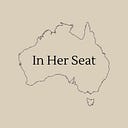Larissa Waters: Compassion and determination
“We need to recognise the value of different leadership styles.”
Almost 100 years ago, Edith Cowan became the first woman elected to an Australian parliament, in March 1921.
In Her Seat is asking as many currently serving female politicians as we can how they view gender equality, politics and their impact.
This is a non-partisan project that is soliciting contributions from women in all parties, or none at all, in every parliament.
Larissa Waters is a Senator from Queensland and leader of the Greens in the Senate.
After leaving a corporate law firm, Larissa became a lawyer at the Environmental Defenders Office, working with communities from farmers to traditional owners on complex environmental issues.
Larissa entered the Senate in 2011 and has been prominent on issues relating to the environment, gender equality and government integrity. She’s worked to establish inquiries on domestic violence and issues facing the Great Barrier Reef.
She shot to national attention when she became the first federal MP to breastfeed in parliament.
What does gender equality mean to you?
Gender equality means women having the same access and opportunities as men in all aspects of their lives.
Equality delivers a more equal, fair and representative society, which ultimately benefits everyone.
It means involving women in decisions that affect us. It means women feeling safe in public, at work, and at home. It means sharing responsibilities and giving women an equivalent level of support to men.
But it also means equal treatment when mistakes are made. Too often, women face higher standards, more intense scrutiny, and harsher criticism than men, which can deter them from speaking up or entering public life.
Which female politicians have inspired or encouraged you?
Christine Milne has been an inspiration and a mentor. She remained passionate, authentic and outspoken in and out of politics, and her keen negotiation skills helped secure some major reforms: new gun laws, gay law reform, and an apology to the Stolen Generation in Tasmania, and a genuinely effective price on carbon in the Federal parliament.
I also really admire the way in which Jacinda Ardern continues to demonstrate that a woman can have a political career and a young family (something that is never questioned for male leaders), and can succeed without conforming to more masculine styles of leadership.
She has shown on the global stage that leading with compassion is strong and effective and more of it is needed!
What inspires you to serve your community?
I’m inspired by everyone who works to make the world a better place. Altruism and using one’s skills and time to make a difference has always been my ethic.
I used to work at the Environmental Defenders Office, and would meet incredible people trying to protect the planet; busy folk who took time from their own working and family lives to fight for causes bigger than their own self-interest.
I look at our school kids who are organising globally and marching against our governments’ climate change inaction and feel so much hope.
Those kinds of people are my heroes.
What are the most important contributions you are making in Parliament?
We have the least transparent government in Australian history, so the Greens and the cross-bench play a critical role in holding them to account and calling them out when they serve the interests of big donors instead of the public.
I’ve introduced bills to ban dirty donations and improve parliamentary standards, aimed at cleaning up politics and making the work we do as elected representatives more transparent.
The Senate passed my bill for a strong federal corruption watchdog more than a year ago, and I’ll keep pushing for the government to vote on it in the House of Reps.
Another important contribution I make is to keep reminding the government and the public of the national crisis of violence against women and what needs to be done to address it.
Finally, normalising women with families in positions of power has been something I hope I’ve contributed to, especially by being the first federal MP to breastfeed in parliament.
What is next for gender equality in politics?
We need not just more women in politics, but more women of colour, women from different backgrounds, and young women, so parliament starts to look like the community.
To make politics a more attractive career path for women, we need to challenge the unfair stereotypes, expectations and judgements that we place on women.
We need to look at more inclusive and family-friendly ways to participate in parliament.
We also need to recognise the value of different leadership styles. It’s no coincidence that women-led countries have come through the coronavirus pandemic in better shape than others.
In Her Seat interviews can be accessed here
